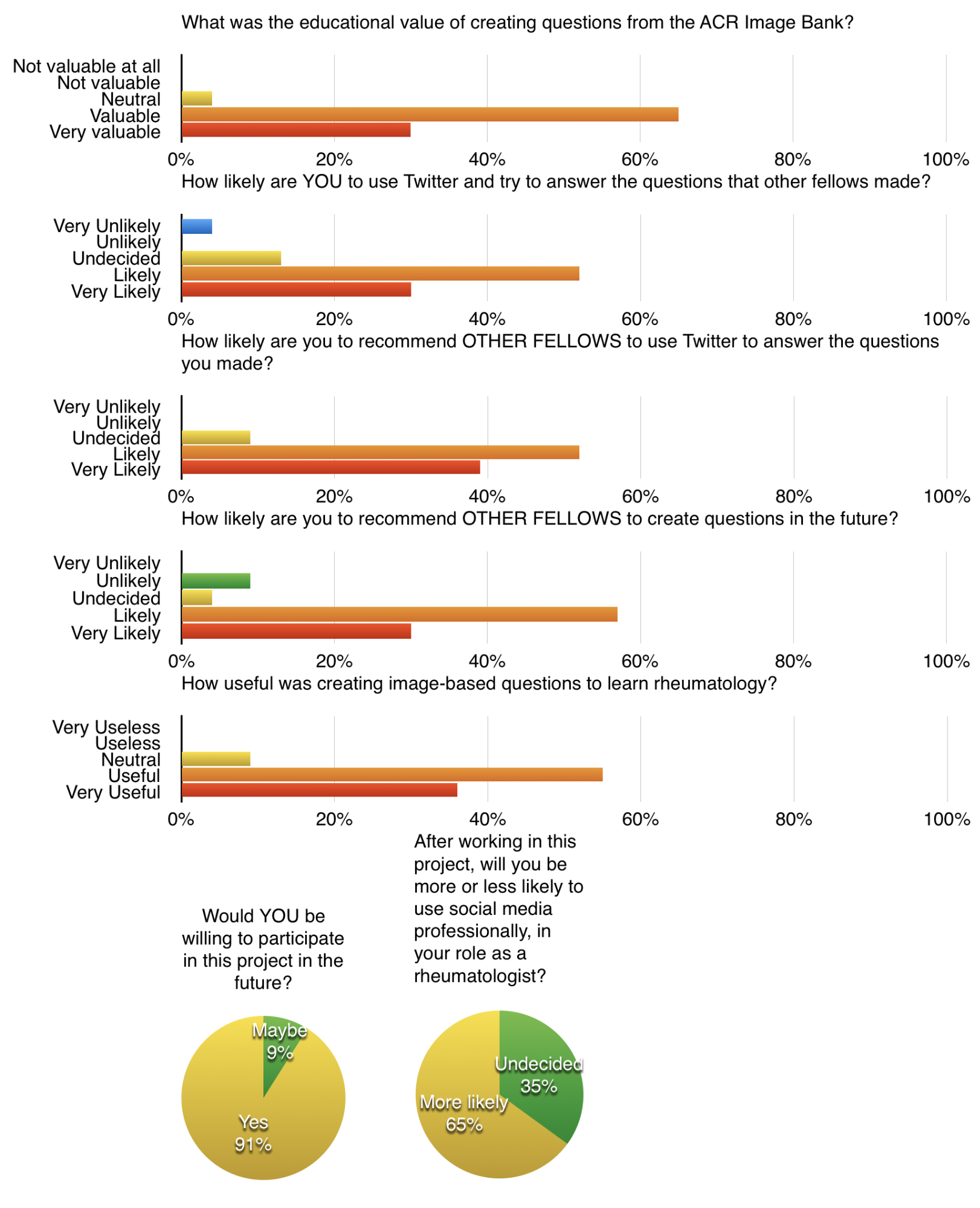Session Information
Date: Tuesday, November 15, 2016
Title: Education
Session Type: ACR Concurrent Abstract Session
Session Time: 4:30PM-6:00PM
Background/Purpose:
There has been increasing interest in using online tools to train physicians. However, most online content does not encourage active learning, and as a result, does not translate into lasting knowledge. I sought to develop an active learning, learner-generated, question-based curriculum, and to disseminate this educational content through social media.
Methods:
Rheumatology Fellows-In-Training (FITs) were invited to participate in the Rheumatology Image of the Week project (#RheumIOW). Each fellow was asked to create questions from one topic of the ACR Image Bank. After participation, FITs were surveyed on their experience.
Questions were reviewed by the ACR Audiovisual Aids Subcommittee. Every Tuesday, starting on 8/4/15, one question was shared via ACR accounts on Twitter, Facebook, and LinkedIn. Online engagement was analyzed and number of Image Bank page views was recorded. For the first month, #RheumIOW tweets were compared with other tweets from the ACR, and Image Bank page views were compared for the month prior to and after starting #RheumIOW.
Results:
28 FITs from 23 different training programs participated. 50% of participants had Twitter accounts and most (78.5%) had “beginner” or “intermediate” experience with social media. The most common reasons to participate were “to learn” (50%) and “to teach” (28.6%).
116 questions were created; the first four are shown in Figure 1. Results from the FIT survey are shown in Figure 2.
Since August, #RheumIOW questions received 4003 Twitter clicks, 7790 Facebook clicks, and 645 LinkedIn clicks. For the first month, as compared to other ACR tweets, those relating to #RheumIOW had 32 times more clicks. Image Bank images relating to #RheumIOW increased in hits from 2- to 100-fold.
Conclusion:
In this project, rheumatology trainees generated educational micro-content, which they found to be a valuable educational experience and useful to learn rheumatology. Learner-generated questions have previously been shown to be highly effective for learning. At the same time, questions were popular with online users, who actively sought the answer from the ACR Image Bank. These users benefited from “practice testing,” the finding that material is better learned and retained when it is tested, rather than when it is simply read.
#RheumIOW shows a novel, inexpensive, and effective way to engage learners through the creation of educational content, which can be shared with the public for their benefit. This method of active learning can be used in the future to address the educational needs of the rheumatology community.
Figure 1. #RheumIOW questions distributed in August 2015.
Figure 2. Results of FIT survey after participation in #RheumIOW.
To cite this abstract in AMA style:
Hausmann JS. Learning Rheumatology through Fellow-Generated Questions: The Rheumatology Image of the Week Project [abstract]. Arthritis Rheumatol. 2016; 68 (suppl 10). https://acrabstracts.org/abstract/learning-rheumatology-through-fellow-generated-questions-the-rheumatology-image-of-the-week-project/. Accessed .« Back to 2016 ACR/ARHP Annual Meeting
ACR Meeting Abstracts - https://acrabstracts.org/abstract/learning-rheumatology-through-fellow-generated-questions-the-rheumatology-image-of-the-week-project/


